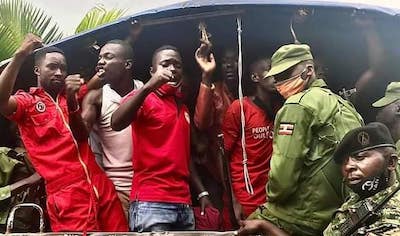Supporters of People Power, movement led by Bobi Wine, being arrested. Photo: Facebook
[Matogo’s Space]
Recently, the Banana Republicanism which colors Uganda yellow has taken on blood-red hues of the deepest dye. A bloody showdown seems imminent.
In full view of a watching world, Uganda’s Police sealed off National Unity Platform’s (NUP) Kamwokya offices and confiscated security cameras, party symbols, money amounting to 23 million shillings which is just over $6,000 —the per capita income here is about $780 according to the World Bank to give you a feel for what that amount is worth—and papers for the party’s nominations.
NUP party leader, Member of Parliament Hon. Robert Kyagulanyi, a.k.a. Bobi Wine, claims these nomination papers were scrawled with over six million signatures. If that was not enough, Kyagulanyi’s home was placed under drone surveillance by the authorities.
Kyagulanyi’s bodyguard Eddie Mutwe shared a picture of a drone on social media and comically captioned it by clarifying that it was not “a star” but a drone surveillance. As the Ugandan public took a shine to Mutwe’s wry humor, disturbing parallels in history loomed over the country like a specter. The agency used to surveil Bobi Wine’s home was the Uganda police, not the Chieftaincy of Military Intelligence, to the Internal Security Organization, or any other of the agencies usually deployed by the State for espionage. This shows that Uganda is a Police State or a State whose apparatus exercises power through the police.
In Uganda, police action is being used in the fashion that other Police States use their police. Namely to control, curtail and cauterize the opposition’s political activity. When our police is in charge of running political interference, you can be sure we have a dangerous situation on our hands.
The global precedents of such police action are as many as they are frightening. South African activist Stephen Biko, who died on Sept. 12, 1977, was a victim of police brutality. After his arrest in Port Elizabeth on the Indian Ocean coast, he was brutally beaten until he got brain damage. Still, he was denied medical treatment and was driven in the back of a police van nearly 700 miles to Pretoria, where he died in prison. Five policemen eventually confessed to this crime. Yet thousands of other South Africans ended up dying in similar fashion at the hands of the South Africa’s police in the Apartheid era.
In Nazi Germany, Adolf Hitler used the police to control the population through spying and violence by deploying the Schutzstaffel (SS) – led by Heinrich Himmler; the Gestapo, and the Sicherheitsdienst (SD) – the intelligence gathering agency of the SS. So one can see how authoritarian regimes the world over have employed the police to inflict mortal blows on civil liberties. However it gets even worse in this COVID-19 era.
The outbreak of this pandemic jolted governments around the world to adopt a miscellany of emergency methods to combat this virus. In countries like Uganda, these emergency measures have been imposed by the police or those wielding police powers. As the State is legitimately tasked to regulate behavior in order to keep us safe from COVID-19, the police have become more intrusive and highhanded. Uganda police now have the power to limit free association in line with COVID-19 regulations by imposing stay-at-home measures, social distancing rules, and the closure of non-essential businesses as well as lockdowns and curfew. In order to do this effectively, the State has used the police in directly monitoring civilian observance of these regulations. It has used indirect surveillance too. Violence has also been used.
Indeed, at one stage, security agencies killed more Ugandans than those killed by COVID-19 in the course of protecting Ugandans from COVID-19. The phenomenon of “pandemic police states” is a global reality. Uganda has, however, merely validated and vindicated pre-existing police arbitrariness through COVID-19 regulations.
The opposition’s persecution is now freely done in the name of “saving lives,” as we shall see further during the course of this ongoing election cycle. Soon, social gatherings will be dispersed by social distancing measures as baton-wielding police charge rallies and outlaw groupings above 10 persons. Stand warned, the state is going to get more repressive.
One may argue that President Yoweri Museveni is not party to such repression and that a shadowy Cosa Nostra has held him hostage as it inflicts the moral code of the Mafia on Uganda. However this argument carries the seeds of disinformation. In an interview with BBC’s Alan Kasujja at State House Entebbe on October 18, 2019, President Museveni said Bobi Wine is an “enemy of the country’s prosperity.” So even if he never personally sanctioned any action against Bobi Wine or NUP, his words imply the sanctioning of such action. His cadres and state operatives may take the initiative in executing their duties in line with the president’s perceived wishes.
Unless he comes out to expressly condemn this behavior, history will conclude harshly that he was perpetrator and not a patsy of Uganda’s Police State.








